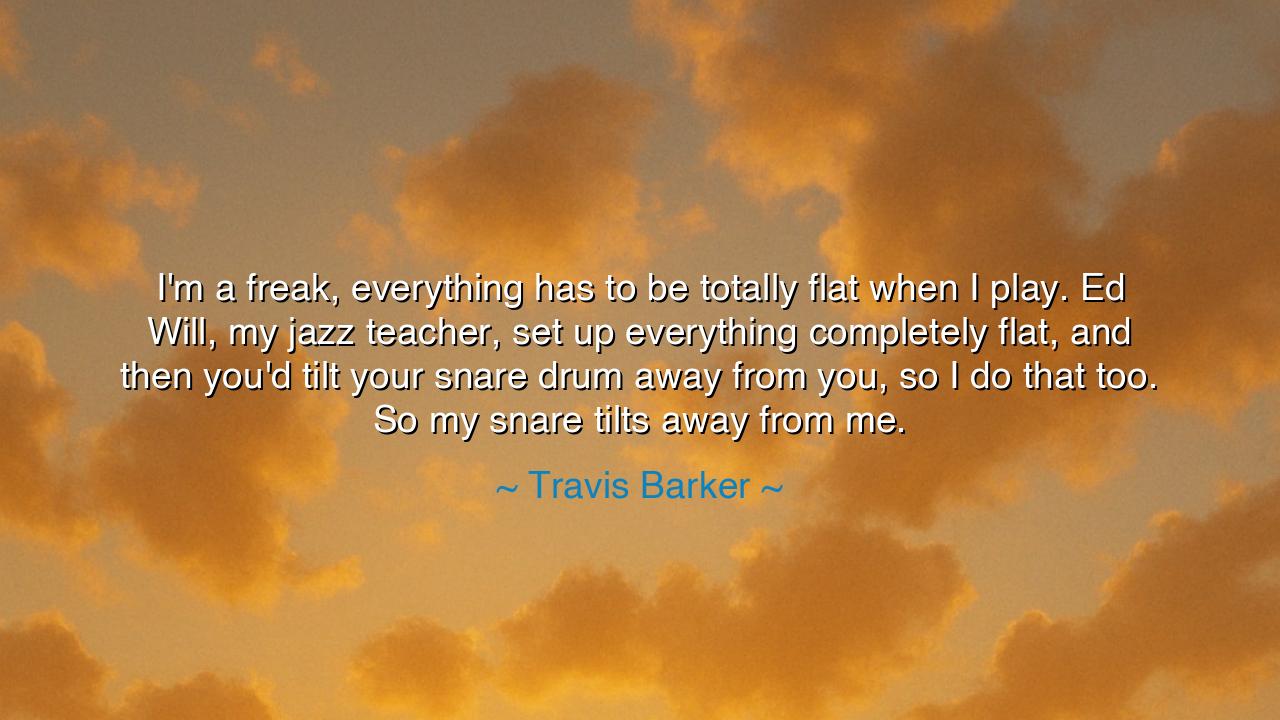
I'm a freak, everything has to be totally flat when I play. Ed
I'm a freak, everything has to be totally flat when I play. Ed Will, my jazz teacher, set up everything completely flat, and then you'd tilt your snare drum away from you, so I do that too. So my snare tilts away from me.






Travis Barker, the warrior of rhythm, once spoke these words: “I'm a freak, everything has to be totally flat when I play. Ed Will, my jazz teacher, set up everything completely flat, and then you'd tilt your snare drum away from you, so I do that too. So my snare tilts away from me.” At first, it seems a mere detail about drums and angles, but in truth it is a revelation about discipline, apprenticeship, and the sacred rituals by which a craft is passed from teacher to student, and from one generation to the next.
The meaning of this quote lies in the devotion to form. Barker calls himself a “freak,” not with shame, but with pride, for his meticulous care in arranging his instruments reveals the seriousness with which he approaches his art. In every field, true mastery requires not only passion but precision. The way the snare drum tilts, the way the tools are arranged, these are not trivial details—they are symbols of respect for the discipline itself. To neglect them would be to neglect the foundation of greatness.
The origin of this ritual comes from his jazz teacher, Ed Will, who instilled in him the importance of setup and order. Teachers shape not only the knowledge of their students but also their habits, their instincts, even the gestures of their hands. The way Barker tilts his drum is more than technique—it is a living echo of his master’s teaching. In this, we see the ancient truth that the lineage of knowledge is not preserved in books alone, but in the physical habits and rituals passed down from mentor to apprentice.
History abounds with similar examples. The great sculptor Michelangelo, before carving the Pietà or David, was first trained in the workshop of Ghirlandaio, where he learned how to prepare stone, mix pigments, and handle tools. Centuries later, his masterpieces bore the invisible marks of those early lessons. So too with the Japanese samurai, who revered the angle at which they drew their swords, for in that angle lay both survival and honor. Likewise, Barker’s tilted snare is a reminder that in the smallest disciplines, greatness is formed.
Yet Barker’s words also teach us the power of individuality within tradition. He takes what was handed down to him and claims it as his own, saying, “I do that too.” He acknowledges his teacher but also embraces the practice with his own spirit, turning it from borrowed wisdom into personal creed. This is the path of every master: to receive tradition, to preserve it, and then to shape it uniquely in one’s own life.
The lesson for us is clear: whatever your craft, honor the details. Do not dismiss them as trivial. Whether you are a musician arranging drums, a writer arranging words, or a leader arranging plans, precision in the smallest things builds power in the greatest things. Seek mentors who will teach you not only skills but also the habits of discipline. Then, as Barker did, carry those habits forward, making them part of your own legacy.
Practically, this means creating rituals for your work. Prepare your space with care. Respect your tools. Observe the practices of those who came before you and learn from them, even in matters that seem small. For the way you hold your pen, the way you tune your instrument, the way you step onto the stage—all of these shape your spirit as much as they shape your craft.
So let Travis Barker’s words be remembered not only as a drummer’s quirk but as an ancient teaching: discipline lives in details, and the lineage of mastery is preserved through ritual. To honor your teacher is to honor your craft. To carry forward their lessons in your own way is to become part of the eternal chain of greatness. Even in the tilt of a snare drum, wisdom lives.






AAdministratorAdministrator
Welcome, honored guests. Please leave a comment, we will respond soon